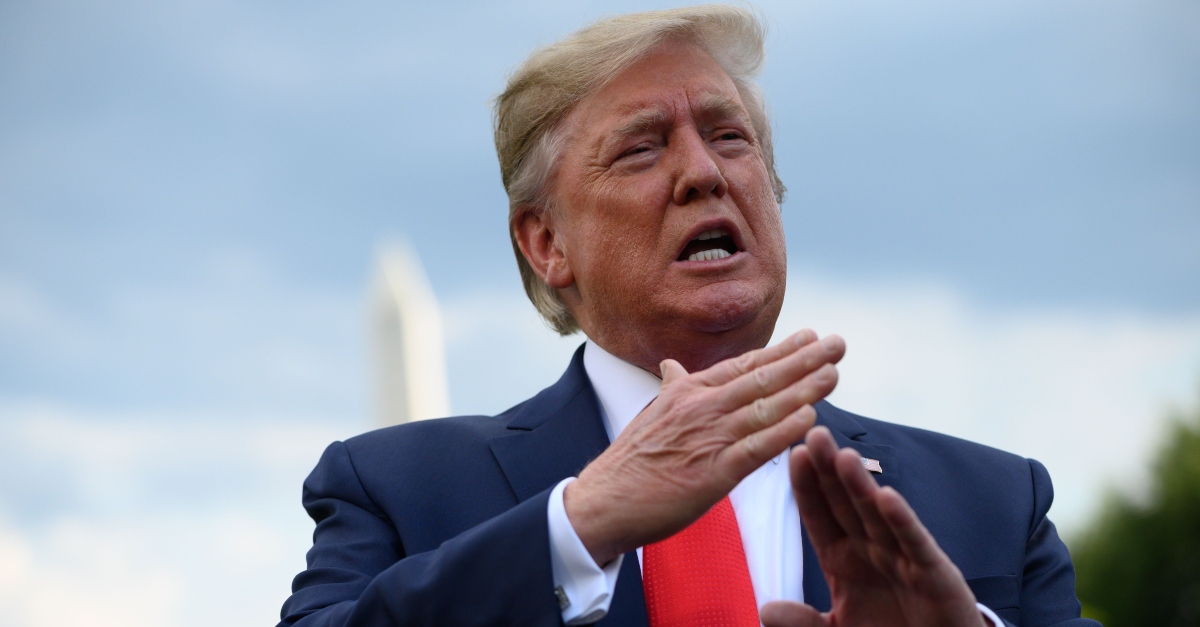
In a recent interview, Anthony Scaramucci opined that President Donald Trump was mentally unstable and that Cabinet officials should consider removing him from office in accordance with the 25th Amendment. In a tweet last week, George Conway, a frequent critic of the president, encouraged White House aides to take Trump to Walter Reed Medical Center and to “convene the cabinet under Section 4 of the Twenty-Fifth Amendment.” Not only are these recommendations baseless and unsubstantiated, they could also face several hurdles, including, but not limited to, the “Goldwater Rule.”
The 25th Amendment of the United States Constitution, Section 4, provides as follows:
Whenever the Vice President and a majority of either the principal officers of the executive departments or of such other body as Congress may by law provide, transmit to the President pro tempore of the Senate and the Speaker of the House of Representatives their written declaration that the President is unable to discharge the powers and duties of his office, the Vice President shall immediately assume the powers and duties of the office as Acting President.
As is evident, the process for expelling/removing the president from power is multi-faceted and is not easy to accomplish. According to Scaramucci, the president should be removed in accordance with the 25th Amendment as a result of his “full-blown insanity.” Said Scaramucci, “I don’t understand how elected public servants of the longest-standing Republican democracy in existing world history, a 243-year-old Republican democracy could have this sort of full-blown insanity on display and not act.”
Scaramucci’s claim would most definitely fail for several reasons. First, Scaramucci’s “diagnosis” that the president suffers from “full blown insanity” is meaningless and offers no substance or evidence that the president is unable to discharge the powers and duties of his office.
In addition, assuming that Scaramucci and Conway were able to convince anyone to consider their 25th Amendment recommendations, any such effort would require the blessing and written support of Vice President Mike Pence. It seems safe to assume that Pence would not support any efforts to use the 25th Amendment against President Trump.
Finally, Scaramucci’s assertion that Trump suffers from “full-blown insanity,” in and of itself, means very little for purposes of the 25th Amendment. To properly establish a claim of this nature, or a claim that the president was not in the right mental state to perform his duties (i.e. due to mental illness) would most likely require the opinion of a licensed psychiatrist or mental health expert.
However, in 1973, the American Psychiatric Association (APA) adopted Section 7.3 in the Principles of Medical Ethics with Annotations Especially Applicable to Psychiatry, which became known as the Goldwater Rule. This rule, which applies to public figures, states, “[I]t is unethical for a psychiatrist to offer a professional opinion unless he or she has conducted an examination and has been granted proper authorization for such a statement.” According to Psychiatric News, the rule restraining psychiatrists’ comments on political candidates is grounded in APA’s response to an attempt to question Barry Goldwater’s mental health during the 1964 campaign for president.
Therefore, if an effort was made to remove Trump in accordance with the 25th Amendment, Section 4, an examination would likely be required to establish an alleged “mental illness” or impaired mental state. Without this, the Goldwater rule could serve to deter doctors from blindly providing their opinion(s). That hasn’t stopped some:
https://twitter.com/duty2warn/status/1166700845666308097?s=20
Despite the Goldwater rule, Tafari Mbadiwe, MD, JD notes that, indeed, some doctors have argued that their expertise and training impose on them a duty to warn the public of the threat posed by Trump’s mental state (thereby permitting them to breach physician-patient confidentiality):
[T]he landmark cases defining the duties owed by psychiatrists to the public aren’t blanket rulings compelling all mental health practitioners to protect the entire public from all possible threats at all possible times. That would be absurd. What these cases actually say is that a therapist can breach physician-patient confidentiality if, and only if, she or he is trying to protect a particular person from a specific threat posed by a client under his or her professional care.
None of those conditions are met by psychiatrists musing about the president’s mental health. Not only have they not personally examined the subject, but the threat they’re concerned about is nebulous in both nature and direction. It’s not even as if psychiatrists are unanimous in their belief that the president has displayed evidence of mental illness. Some dispute, for instance, that his personality has caused himself distress, suffering, or impairment, which are widely seen as bedrock characteristics of mental illness. And all of that comes before we reach the question of whether it’s even possible to make accurate psychological assessments on the basis of thin data and remote observations.
If public questioning of politicians’ mental health becomes an effective political tool, what’s going to happen next time there’s a Democrat in the White House? For politically motivated physicians, it’s a slippery slope and a long way down.
In light of the foregoing, those pushing to remove the president will likely be disappointed. The vice president won’t agree to it and the Goldwater rule could hinder such efforts. As such, the chances of successfully utilizing Section 4 of the 25th Amendment to remove the president at the present time are incredibly small.
Mr. Hakim is a political writer and commentator and an attorney. His articles have been published in The Washington Examiner, The Daily Caller, The Federalist, The Algemeiner, The Western Journal, American Thinker and other online publications. Twitter: @ThoughtfulGOP.
[Image Roberto Schmidt/AFP/Getty Images]
This is an opinion piece. The views expressed in this article are those of just the author.